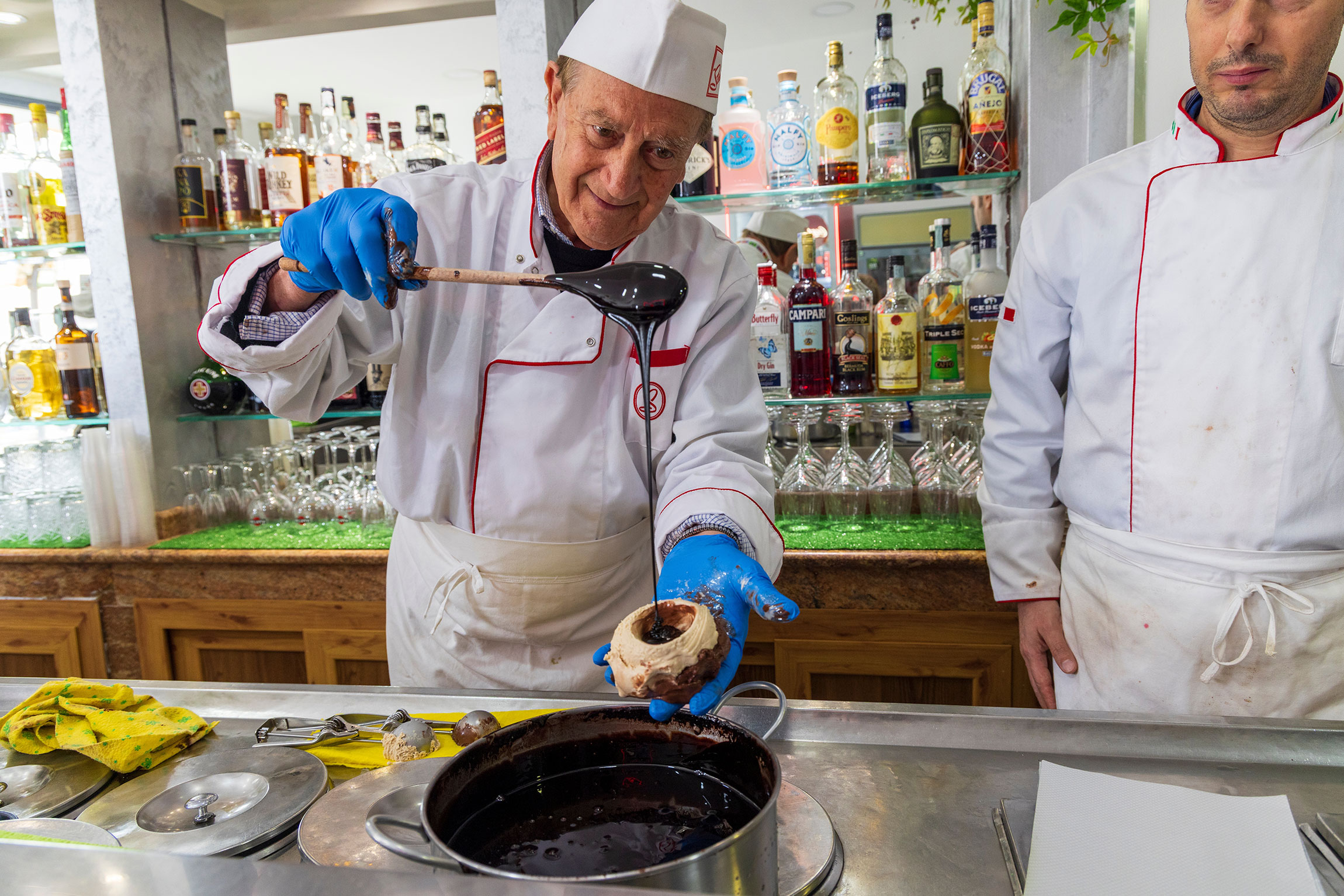In Italy, he became TV popular only in very recent months, after news and gossip outlets alike made known he custom made the shirt POTUS Donald Trump wore on inauguration day, but the much criticized American first citizen is far from being his only famous customer: Italian comedian Checco Zalone is one of his clients and so is the heir to the British throne, Prince William who, in fact, wore one of his creations on the day of his wedding to the Duchess of Cambridge, Kate Middleton.
Angelo Inglese has been handling all the media attention coming from making clothes for the most controversial person alive with an all Italian aplomb and, in truth, with a lot of healthy and refreshing humbleness. When asked by Selene Gagliardi of the “Huffington Post” about some Italian artists’ refusal to sing at the inauguration, and whether he felt uncomfortable working for Trump, he very elegantly said “I don’t see my work for Mr. Trump as a question of politics. All I want is to do my job well, beyond all political ideologies. What counts the most to me is keeping high the flag of authentic “made in Italy” in the world, especially when it comes from smaller business realities.” In the same interview, Inglese thanked the Italian-American community which, he mentioned, has made his work known in the US.
Angelo Inglese and his small, family run company, embody all that is good and beautiful about original, authentic made in Italy: traditional values, attention to detail and an enormous stress on quality over quantity. When asked about his company’s sheer numbers, in another interesting interview appeared on the website madeintaranto.org, Inglese highlights how “my reality is a very small one. We’re an atelier that chose to remain smaller to give importance to quality rather than quantity.”
His many customers, from Italy and all over the world, appear to appreciate not only the uncontestable beauty and quality of his pieces, but also the very essence of his business: “they fall in love with the way we work and with the sense of family and welcoming they experience when they are here, in Ginosa (the village where Inglese’s atelier operates, author’s note),” he declared to madeintaranto.org.
Family and territory are crucial values in Inglese’s work view, values which made his enterprise flourish. It was Angelo’s grandmother who started the business, opening a small tailor shop in Ginosa, a town of about 22 thousands in the province of Taranto. Angelo’s parents made it thrive and today he’s in charge of this beautiful example of a quintessential Italian business. His products are made following traditional artisanal methods, all fabrics chosen among the most beautiful and luxurious, each piece unique and bespoke, each step of its creation often described in detail to his customers “to make them curious, make them part of a process the aim of which is not solely and simply to create profit, but also to create emotions.”
It is, indeed, a beautiful idea to associate to a product, so distant from that “use once and destroy” mentality that so much characterizes the high street today, and of which we are all more or less victims. It is an idea that encapsulates the real essence of Italian crafts, where things are made to last a lifetime, so beautiful to stand the test of time and trends passing.
Reading about Angelo Inglese and his small, renowned atelier made me think of my grandmother, who was a lacemaker: she would make lace as light as sea foam, as precious as gold. All the beauty was in the details, in the softness of the thread, in the delicate intricacy of the pattern: well into her 80s, she would create beautiful pieces, her fingers precise and fast in spite of age. For some reason, I imagine the care, love, attention and dedication of Inglese for his products is the same my gandmother had all those years ago for her beautiful laces; more than a simple attitude, it is a forma mentis borne off generations and generations of artisans and craftsmen proud of their skills and of their work.
Tireless and precise, these artisans and their small business realities are, and always have been, the heart and soul of true “made in Italy”: entrepreneurs, of course, but craftsmen and artists first and foremost. In such hard times for Italy’s economy and, in truth, also for timeless values such as family, dedication, professionalism and sense of cultural belonging, finding someone like Angelo Inglese feels like finding that first tiny daisy of the season, in a field still half covered in winter snow: it may be little, but it makes you understand the good season is just around the corner.
In Italia è diventato popolare in tv solo negli ultimi mesi, dopo notizie e pettegolezzi sul fatto che sia stato lui a creare la camicia POTUS che Donald Trump ha indossato il giorno dell’insediamento, ma il molto criticato primo cittadino americano è ben lontano dall’essere il suo principale cliente famoso: l’attore comico italiano Checco Zalone è uno dei suoi clienti e così lo è l’erede al trono britannico, il Principe William che, infatti, ha portato una delle sue creazioni nel giorno del suo matrimonio con la Duchessa di Cambridge, Kate Middleton.
Angelo Inglese si occupa di tutta l’attenzione mediatica che viene dal fare vestiti per le persone più controverse con un aplomb tutto italiano e, in verità, con molta umiltà sana e tonificante. Quando è stato interrogato da Selene Gagliardi dell’”Huffington Post sul rifiuto di alcuni artisti italiani a cantare il giorno dell’insediamento, e se lui si sentisse a disagio nel lavorare per Trump, molto elegantemente ha risposto: “Non vedo il mio lavoro per il Sig. Trump come una questione politica. Tutto ciò che voglio fare bene è il mio lavoro, al di là di tutte le ideologie politiche. Quello che conta di più per me è tenere alta la bandiera dell’autentico “Made in Italy” nel mondo, specialmente quando viene dalle più piccole realtà di business”. Nella stessa intervista, Inglese ringraziava la comunità italo-americana che, ha detto, ha reso noto il suo lavoro negli Usa.
Angelo Inglese e la sua piccola impresa a conduzione familiare, incarna tutto ciò che di buono e bello c’è sul made in Italy originale e autentico: valori tradizionali, attenzione al dettaglio ed una enorme attenzione alla qualità rispetto alla quantità. Quando gli hanno chiesto del valore della sua società, in un’altra intervista interessante apparsa sul sito web madeintaranto.org, Inglese ha evidenziato come la “mia realtà è molto piccola. Siamo un atelier che ha scelto di rimanere più piccolo per dare l’importanza alla qualità piuttosto che alla quantità”.
Molti suoi clienti, italiani e di tutto il mondo, sembrano non solo apprezzare la bellezza incontestabile e la qualità dei suoi capi, ma anche la vera essenza dei suoi affari: “Si innamorano del modo in cui lavoriamo e dell’accoglienza familiare che provano quando vengono qui a Ginosa (la cittadina dove opera l’atelier di Inglese, n.d.a.)” ha dichiarato a madeintaranto.org.
Famiglia e territorio sono valori cruciali nel modo di lavorare di Inglese, valori che fanno fiorire la sua impresa. Fu la nonna di Angelo che avviò gli affari, aprendo un piccolo negozio di sartoria a Ginosa, una città di circa 22mila abitanti nella provincia di Taranto. I genitori di Angelo lo fecero crescere ed oggi lui è responsabile di questo bell’esempio della quintessenza dell’impresa italiana. I suoi prodotti sono fatti seguendo i metodi artigianali tradizionali, tutti i tessuti sono scelti fra i più belli e lussuosi, ogni pezzo è unico e su misura, ogni passo delle sue creazioni è descritto nel dettaglio ai suoi clienti “per incuriosirli, per renderli parte del processo il cui scopo non è solamente e semplicemente creare profitto, ma anche creare emozioni”.
È, davvero, una bella idea da associare ad un prodotto, così distante da quella mentalità dell’ “uso una volta e poi butto via” che così tanto caratterizza la vita di oggi, e di cui tutti noi siamo più o meno vittime. È un’idea che incapsula la vera essenza dell’artigianato italiano, dove le cose sono fatte per durare una vita, così belle da poter sostenere la prova del tempo e delle mode che passano.
Leggere di Angelo Inglese e del suo piccolo, rinomato, atelier mi ha fatto pensare a mia nonna che faceva pizzi: merletti leggeri come schiuma marittima, preziosi come l’oro. Tutta la bellezza era nei dettagli, nella leggerezza del filo, nella complessità delicata del modello: ultraottantenne, era in grado di realizzare bei pizzi, le sue dita precise e veloci nonostante l’età. Per la stessa ragione, io immagino che la cura, l’amore, l’attenzione e la dedizione di Inglese per i suoi prodotti sia la stessa che ha avuto mia nonna negli anni passati per i suoi bei merletti; molto più di una semplice cura, è una forma mentis coltivata da generazioni e generazioni di artigiani e maestri orgogliosi delle loro abilità e del loro lavoro.
Instancabili e precisi, questi artigiani e le loro piccole aziende sono, e sempre sono state, il cuore e l’anima del vero “Made in Italy”: imprenditori, certo, ma artigiani ed artisti prima e soprattutto. In questi tempi difficili per l’economia italiana e, in verità anche per valori senza tempo come famiglia, dedizione, professionalità e senso di appartenenza culturale, trovare qualcuno come Angelo Inglese, fa sentire come trovare la prima margherita della stagione in un campo ancora mezzo coperto dalla neve d’inverno: può essere poco, ma fa capire che la bella stagione è proprio dietro l’angolo.






























